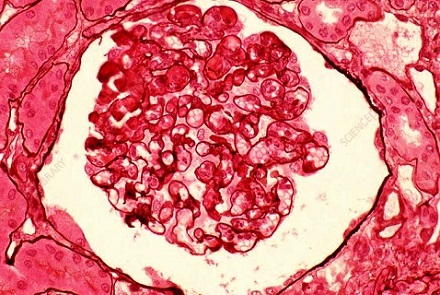Stephen G Brian Fact checked by:Thailand Medical News Team Sep 02, 2024 1 year, 1 week, 3 days, 20 hours, 49 minutes ago
Medical News: The global COVID-19 pandemic has brought many unexpected challenges and revelations to the medical field. Among these is the connection between COVID-19 and various autoimmune disorders, some of which are previously unheard of in relation to the virus. A recent case study in Netherlands has brought to light a rare complication of COVID-19: type 1 cryoglobulinemia, a condition that could easily be overlooked due to its rarity. This
Medical News report explores this unusual case and delves into the findings that may change how we understand the impacts of COVID-19 on the human body.
 Case study shows that COVID-19 can trigger type 1 cryoglobulinemia
Understanding Cryoglobulinemia
Case study shows that COVID-19 can trigger type 1 cryoglobulinemia
Understanding Cryoglobulinemia
Cryoglobulinemia is a condition where certain proteins in the blood, known as cryoglobulins, clump together at cold temperatures, leading to blockages in blood vessels. This condition is categorized into three types based on the composition of the cryoglobulins. Type 1 cryoglobulinemia is typically associated with blood cancers such as multiple myeloma or Waldenström macroglobulinemia. It is a rare condition where monoclonal immunoglobulins, mostly IgG or IgM, precipitate in the blood. The blockage of small blood vessels caused by these cryoprecipitates can lead to symptoms such as skin ulcerations, Raynaud's phenomenon, and even kidney issues.
However, infections have rarely been reported as a cause of type 1 cryoglobulinemia, making this recent case particularly significant.
The Case at Hand
The case involved a 42-year-old man with no prior medical history who was referred to the internal medicine department of Meander Medical Center in Amersfoort, Netherlands. He was experiencing renal failure, anemia, and general malaise following a recent mild COVID-19 infection. His symptoms, initially mild, took a dramatic turn after his COVID-19 diagnosis, highlighting the importance of understanding this rare but significant complication.
The patient, who was fully vaccinated against COVID-19, had experienced a mild episode of the disease about four weeks prior to his hospital visit. Despite his recovery from the initial infection, he continued to suffer from weakness, shortness of breath, loss of appetite, and shivering. Additionally, he noticed purple spots on his lower legs, which disappeared on their own. Upon further examination, doctors identified these spots as vascular purpura, a condition where small blood vessels burst, causing purple spots on the skin.
Blood tests revealed anemia (hemoglobin: 10.3 g/dL), thrombocytopenia (90,000/mm³), and impaired kidney function (creatinine: 2.19 mg/dL). Further tests confirmed the presence of type 1 cryoglobulinemia, which was unusual given the lack of an underlying blood cancer, typically associated with this condition.
COVID-19 as a Trigger
Given the unusual nature of this case, the medical team, including researchers from the Department of Internal Medicine and the Department of Medical Microbiology and Medical Immunology at Meander Medica
l Center, and the Clinical Laboratory at Unilabs in Enschede, Netherlands, suspected a connection between the patient’s COVID-19 infection and his cryoglobulinemia. Further analysis revealed that the cryoglobulins in the patient’s blood were composed of dual IgM antibodies, specifically directed against the SARS-CoV-2 virus, the virus responsible for COVID-19.
This finding was crucial as it indicated that the COVID-19 virus might have directly triggered the cryoglobulinemia in this patient. The identification of SARS-CoV-2 specific antibodies in the cryoprecipitate provided strong evidence for this hypothesis.
Patient Recovery and Observations
Interestingly, the patient’s condition began to improve on its own. His kidney function returned to normal, and his anemia started to resolve. Three months after the initial presentation, follow-up tests showed that the cryoglobulins were no longer detectable, suggesting that the condition had resolved itself as the viral infection cleared from his body.
This spontaneous recovery, along with the lack of an underlying blood cancer, led the medical team to conclude that the cryoglobulinemia was indeed a direct result of the COVID-19 infection, rather than a manifestation of a more serious underlying condition.
Implications of the Study
This case is particularly important because it highlights a new and rare complication of COVID-19 that could easily be missed. Most cases of cryoglobulinemia associated with infections are type II or III, which are polyclonal and often associated with chronic infections like hepatitis C. However, in this case, the type I cryoglobulinemia was monoclonal, which usually points to an underlying lymphoproliferative disorder - a condition that was not present in this patient.
The case also raises questions about the mechanisms by which COVID-19 can trigger such a rare condition. It is known that chronic infections can lead to continuous stimulation of the immune system, potentially leading to the production of monoclonal antibodies. However, the exact pathway through which COVID-19 causes type 1 cryoglobulinemia remains unclear.
This study suggests that COVID-19 may have the ability to trigger rare autoimmune responses, even in the absence of other underlying conditions. The findings emphasize the need for healthcare professionals to be aware of this potential complication, especially in patients who continue to experience unusual symptoms long after their initial recovery from COVID-19.
Conclusion
In conclusion, this case study sheds light on a rare but significant complication of COVID-19 - type 1 cryoglobulinemia. The connection between the virus and the development of this condition in a previously healthy individual highlights the diverse and often unpredictable nature of COVID-19’s impact on the human body. As the medical community continues to uncover the long-term effects of COVID-19, it is crucial to remain vigilant for such rare complications.
The study findings were published in the peer-reviewed journal Annals of Hematology.
https://link.springer.com/article/10.1007/s00277-024-05970-y
For the latest COVID-19 News, keep on logging to Thailand
Medical News.
Read Also:
https://www.thailandmedical.news/news/covid-19-can-cause-the-onset-or-aid-in-the-progression-of-alzheimer-s-disease-ischemic-stroke-and-multiple-sclerosis
https://www.thailandmedical.news/news/ige-antibodies-found-to-play-a-role-following-both-natural-infection-and-various-types-of-covid-19-vaccinations
https://www.thailandmedical.news/news/covid-19-causes-coronary-artery-lesions-and-plaque-ruptures-in-coronary-artery-disease-patients
